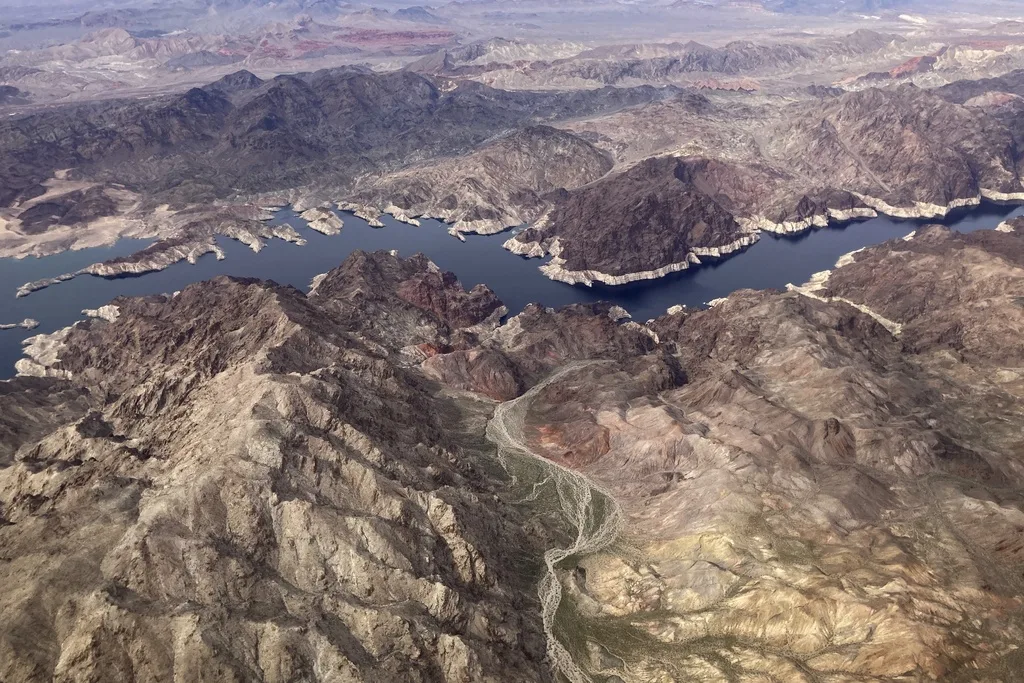
FILE - A bathtub ring shows where the water mark on Lake Mead once was along the boarder of Nevada and Arizona, March 6, 2023, near Boulder City, Nev. Nearly half of the U.S. West has emerged from drought, but intense water challenges persist, scientists said Tuesday, May 9. (AP Photo/John Locher, File)
Lawmakers say the bipartisan bill would give the US Army Corps of Engineers tools needed to respond to drought conditions in the West and better manage water resources.
A bipartisan group of congressional lawmakers introduced a bill last week that seeks to provide the US Army Corps of Engineers increased funding and authority to help combat long-term drought conditions in the West.
The Drought Resilient Infrastructure Act would direct the Army Corps to prioritize water conservation or storage efforts at Corps facilities over other missions such as flood control or combating invasive species during times of drought. But the bill would also provide the Corps with new infrastructure programs to help states, counties, tribes, and other locales to construct projects to mitigate drought conditions.
The bill was introduced Thursday by Arizona Democratic US Rep. Greg Stanton and co-sponsored by Nevada Reps. Susie Lee and Dina Titus, both Democrats. A nearly identical version of the bill was introduced in the Senate by lawmakers from Arizona, California, and Nevada.
“Southern Nevada continues to deal with the effects of our worst drought in centuries, and we need bold solutions to protect our precious water, natural resources, and the hardworking families who depend on them,” Lee said in a statement. “Our bipartisan legislation will make sure the Army Corps of Engineers is using all of their tools and resources to combat drought, upgrade our infrastructure and boost water conservation efforts.”
MORE: Nevada to get $9M in federal grants for water projects
The Army Corps operates more than 700 dams, 900 harbors, and 12,000 miles of inland waterways, according to Lee’s office. Among other responsibilities, the Corps stores emergency supplies of drinking water, manages navigable waterways, and funds drought mitigation projects.
“As Nevada and the West confront historic drought, we must implement innovative solutions to conserve water,” Sen. Jacky Rosen (D-Nevada) said in a press release announcing the bill.
But Lee’s office says under current law, the Corps lacks the authority to modify operations at its own facilities. The new legislation would give the Corps new authorities to cut through red tape relating to its own water conservation, drought resilience, and emergency drought operations.
Despite recent winters with increased snowpack, the US Drought Monitor estimates more than half of the western US is currently impacted by drought conditions. Areas within Arizona, California, Colorado, Idaho, Montana, Nevada, New Mexico, Oregon, Utah, Washington, and Wyoming are all considered to be facing drought.
The drought has been especially burdensome for states like Nevada, Arizona and California — which are among a contingent of states that source drinking water from the Colorado River. Those three states reached a deal with the federal government last year to reduce their allotted share of Colorado River Water by 3 million-acre-feet through 2026 as states along the river continue to negotiate reforms to the 1922 agreement dictating how the river’s water is shared.
“With Arizona facing an unprecedented drought, proper infrastructure and water management systems are crucial,” Rep. Juan Ciscomani (R-Arizona) said in a statement. “This bipartisan effort provides the Army Corps of Engineers with the needed resources to mitigate the effects of the drought, further prioritize water conservation efforts, and upgrade existing infrastructure to better serve our communities.”
Support Our Cause
Thank you for taking the time to read our work. Before you go, we hope you'll consider supporting our values-driven journalism, which has always strived to make clear what's really at stake for Nevadans and our future.
Since day one, our goal here at The Nevadan / El Nevadense has always been to empower people across the state with fact-based news and information. We believe that when people are armed with knowledge about what's happening in their local, state, and federal governments—including who is working on their behalf and who is actively trying to block efforts aimed at improving the daily lives of Nevada families—they will be inspired to become civically engaged.


Climate Impact & Nevada’s Path Forward: Join us for a free event at Springs Preserve this Friday
This Friday on October 11th at Springs Preserve, The Nevadan / El Nevadense is hosting Climate Impact & Nevada's Path Forward, a FREE event!...

Extreme heat bill authored by Nevada Rep. Dina Titus advances in House
If enacted, the bill would allow the federal government to declare extreme heat a disaster, vastly changing the way officials are able to respond to...

Pahrump-based utility to receive $80M for solar project through Inflation Reduction Act
The funding will help subsidize the installation of a 37-megawatt solar power generation and storage system that will service the Pahrump and Fish...

Opinion: Taking on Big Oil and promoting clean energy is the way forward for Nevada. That’s why we must elect Kamala Harris.
As the first Black and AAPI woman to lead the ticket for a major political party, Kamala Harris’ candidacy is historic. Her climate and clean energy...

Here’s how the Biden-Harris administration is helping water levels rebound in the drought-stricken West
A snowier-than-usual winter combined with billions in federal funding from the Bipartisan Infrastructure Law and Inflation Reduction Act have helped...

Report: Nevada the highest rate of residents using tax credits to adopt residential solar
More than 2% of the Nevada households that filed a federal tax return last year received subsidies aimed at helping offset costs of residential...





